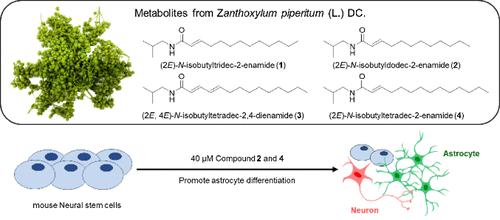A New Alkylamide with Odd-Chain Fatty Acid from Pericarps of Japanese Pepper (Zanthoxylum piperitum (L.) DC.)
IF 2.6
Q2 FOOD SCIENCE & TECHNOLOGY
引用次数: 0
Abstract
Neural stem cells (NSCs) are pluripotent stem cells that can differentiate into neurons and glia cells. They continue to supply these cells throughout life in the adult central nervous system. However, it is revealed that differentiation capacity of NSCs has been to decrease with aging and mental stress. The decreasing capacity suspected to be associated with the development of neurodegenerative diseases and depression. Therefore, compounds that regulate the differentiation of NSCs into astrocytes may provide a good clue to understanding the role of astrocytes in maintaining brain function. In this study, the extracts of the pericarps of Japanese pepper (Zanthoxylum piperitum (L.) DC.), which has long been popular as a spice in Japanese cuisine, were subjected to solvent fractionation, purification and spectral analysis. As a result, an alkylamide with an unusual odd-chain fatty acid moiety, (2E)-N-isobutyltridec-2-enamide (1), was isolated along with three known alkylamides (2–4). All these alkylamides were evaluated for their promoting activity in the differentiation of mouse neural stem cells (mNSCs) into astrocyte. As the result, compounds 2 and 4 increased numbers of glial fibrillary acidic protein (GFAP)-positive cells in in vitro differentiation assays using mNSCs. These findings suggest the potential for new uses of Japanese pepper as a functional food that could be applied to the prevention and treatment of neurodegenerative diseases and depression.

一种来自日本胡椒(Zanthoxylum piperitum (L.) DC.)果皮的新型奇链脂肪酸烷基酰胺
神经干细胞(NSC)是多能干细胞,可分化为神经元和胶质细胞。它们在成人中枢神经系统的整个生命过程中持续提供这些细胞。然而,有研究表明,随着年龄的增长和精神压力的增加,神经干细胞的分化能力会下降。这种能力的下降被怀疑与神经退行性疾病和抑郁症的发生有关。因此,能调节 NSCs 向星形胶质细胞分化的化合物可能为了解星形胶质细胞在维持大脑功能方面的作用提供了很好的线索。在这项研究中,研究人员对长期以来作为日本料理香料而深受欢迎的日本胡椒(Zanthoxylum piperitum (L.) DC.)的果皮提取物进行了溶剂分馏、纯化和光谱分析。结果,分离出了一种具有不寻常奇链脂肪酸分子的烷基酰胺,即 (2E)-N-isobutyltridec-2-enamide (1),以及三种已知的烷基酰胺 (2-4)。对所有这些烷基酰胺在促进小鼠神经干细胞(mNSCs)向星形胶质细胞分化方面的活性进行了评估。结果发现,在使用 mNSCs 进行的体外分化试验中,化合物 2 和 4 增加了胶质纤维酸性蛋白(GFAP)阳性细胞的数量。这些研究结果表明,日本胡椒有可能作为一种新的功能性食品,用于预防和治疗神经退行性疾病和抑郁症。
本文章由计算机程序翻译,如有差异,请以英文原文为准。
求助全文
约1分钟内获得全文
求助全文

 求助内容:
求助内容: 应助结果提醒方式:
应助结果提醒方式:


